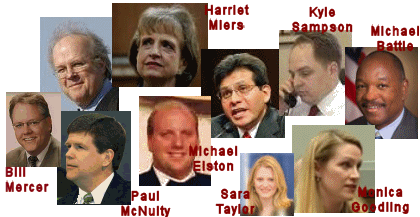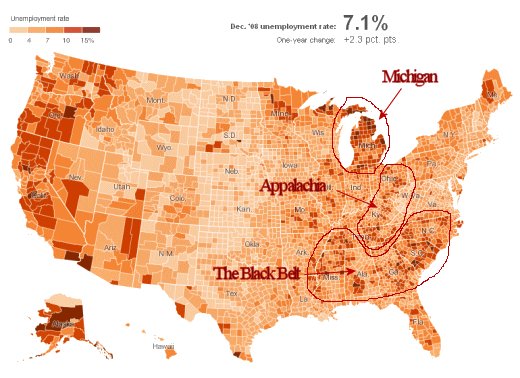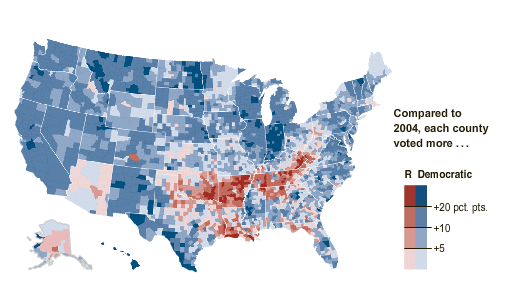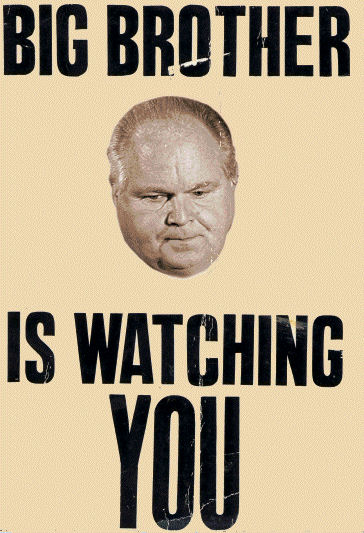There are times when objectivity simply cannot be achieved. I claim absolutely no objectivity here [as evidenced by my "Big Brother" Poster below]. I’m obviously not going to like this editorial as soon as I read the title, but when I see who wrote it, it’s all over. I would be more likely to be sympathetic to Saddam Hussein’s courtroom rhetoric or Adolph Eichman’s claims that he was just a bureaucrat [neither of which had any chance with me from the very start]. In spite of that intense bias, I’m going to comment [with no claim of being rational or even helpful].
In the first two months of 2009, the Democratic Congress and the White House have spent more money than the combined cost of the Iraq and Afghanistan wars and the response to Hurricane Katrina. After they doled out taxpayer dollars at such a blistering pace, the instinct of many inside the Beltway is to do what’s most convenient: desperately try to change the subject by creating straw men – called "the party of no" – to rally against. And in a carefully calculated campaign, operatives and allies of the Obama administration are seeking to divert attention toward radio host Rush Limbaugh, and away from a debate about our alternative solutions on the economy and the irresponsible spending binge they are presiding over. This diversionary tactic will not create a single job or help a single family struggling in today’s economic crisis. And that is where our focus should be.
Make no mistake: This strategy did not develop out of thin air. Democratic pollsters began laying the groundwork for this effort last fall. What’s particularly regrettable is that all this is unfolding at a time our nation can least afford it. President Obama has said that we must change the way Washington operates in order to address the unprecedented challenges of today. I hope that those inside and close to the administration begin heeding his advice, because the change-the-subject campaign they are employing is the oldest trick in Washington’s book. This isn’t about the leadership of political party officials or the influence of radio hosts. It’s about the need for both parties to work together toward real solutions to end this recession and put Americans back to work.
It’s no secret that middle-class families and small businesses across our nation are hurting. Their job security is diminishing, their budgets are tightening, and their 401(k)s and college savings are evaporating. During this recession, they are being forced to make difficult budget decisions; unfortunately, Congress and the administration do not feel the responsibility to do likewise. Instead, the profligate spending we’ve seen over the past two months is simply breathtaking – and it’s exactly why some here in Washington are scrambling to change the subject.
Consider what Washington Democrats have "accomplished" since the beginning of the year: The administration requested $350 billion from the Troubled Assets Relief Program even though neither the Bush administration nor the Obama administration has adequately answered questions about where the first $350 billion went and what strategy Treasury officials have developed to get the government out of the private sector. President Obama signed "stimulus" legislation that costs twice as much as the House GOP’s alternative bill but that will create only half as many jobs.
The president apparently plans to sign the $410 billion "omnibus" spending bill, even though it is loaded with some 9,000 unscrutinized earmarks and the largest increase in discretionary spending – save for a brief increase after the Sept. 11, 2001, terrorist attacks – since the Carter administration. And the Obama administration has proposed a budget blueprint that increases taxes on every American, to the total tune of $1.4 trillion. Each of these policy proposals is meant to lay the groundwork for a new era of big government – and neither Main Street nor Wall Street likes what it is seeing.
Markets are plunging, businesses are cutting jobs and families are growing more anxious every day. Moments like this demand the kind of cooperation and new way of doing business that Obama has promised. Instead, those around him are taking to the airwaves and the pages of our nation’s newspapers to carry out a campaign intended to change the subject and divert attention from what matters most: finding a way to work together to get our economy moving again.
Something is wrong when the discourse in Washington is more focused on a political sideshow than, say, the fact that Congress is attempting to terminate a school choice program that serves thousands of needy children in the District of Columbia, or the impact of a presidential budget that raises taxes on millions of Americans during a recession. When it comes to jobs, the budget, children’s health care and other issues, House Republicans have offered what we believe are better solutions to the problems facing middle-class families and small businesses. We will continue to do so in the coming months and hope that White House political operatives abandon their cynical "change the subject" strategy by joining us.

Once a week, I buzz by the Rush Limbaugh web site – just to see what he’s up to. I started doing that a year ago during his
Operation Chaos at the time of the Democratic Primaries. In case you missed it, Limbaugh declared a campaign to get Republicans to cross-over and vote in the Democratic Primaries for Hillary Clinton. This was a big deal – a part of every radio show and web page. In some States, it was even illegal, but he and his followers marched forward. His objectives were clearly stated on the tee shirts he sold on his web site [click the image for a larger, more readable version].

In addition to this ludicrous campaign, he jumped on [or lead] every attack on Obama – Ayres, Muslim, Wright, smoker, etc. No day was complete without some obnoxious, sarcastic "Barry" graphic and numerous slanderous articles. It was a "study in contempt," in which vague facts, innuendo, rumor, and just plain lies intermingled in a symphony of hatred and snarling devaluation reminiscent of a Ku Klux Klan rally.
After the election, there was no letup in Limbaugh’s sarcasm and contempt culminationg in his famous four words, "I hope he fails!" And the rhetoric has continued throughout the debates on the Stimulus Package and every cabinet pick. Finally, last week, Limbaugh appeared in Prime Time at CPAC as the featured speaker, rambling on endlessly spewing his venom. His speech was carried on CSPAN.
The Four Elephants




1. Rush has eaten his way into Elephantine proportions again.

The pictures on his web site were obviously taken after a diet of some sort, but it’s over now. He’s huge, looking like the fat, obnoxious bully I’m sure he’s always been.
2. There’s a story of the blind men and an Elephant.

Each blind man feels a different part of the animal and makes up a story from the part about the nature of the whole animal – all grossly inaccurate. Right now, that’s what’s happening in Washington. Limbaugh and the Republicans are poring over every proposal the Democrats make and finding the soft spots, blowing them up into huge issues, and ignoring the essence of the whole [Unfortunately, the Democrats are not immune to this same tactic].
3. There’s a saying in the recovery community, "… the Elephant in the Living Room."

It refers to what happens in a family where one member is an Alcoholic. Some such families never talk about the Alcoholic’s drinking [or the Rage-oholic’s abuse]. The biggest thing that’s happening with the family is avoided. Right now, in response to the largely Republican governance, this country is going to hell in a handbasket. This is the biggest emergency of our lifetimes, and it requires drastic action. The last Administration exhausted all other measures – tax cuts, interest rate drops, rebates – and now the only possibility is mammoth reform and mammoth spending. This financial crisis is the biggest Elephant of them all. Speaking of biggest Elephants, Rush Limbaugh has inserted himsef into the forefront of the Republican Campaign as a loud, unavoidable central figure. After he’s made an amazing amount of noise, Boehner’s asking why we’re listening.
4. And finally, Republicans:

Back in 1874, America’s famous cartoonist, Condé Nast drew this cartoon for Harper’s mocking the Democrats ["asses in a lion’s skin"] and the Republicans jumped on the Elephant as their symbol [not bad – lumbering, big, ugly]. Our fourth Elephant’s leader, John Boehner, tells us that, "… in a carefully calculated campaign, operatives and allies of the Obama administration are seeking to divert attention toward radio host Rush Limbaugh, and away from a debate about our alternative solutions on the economy and the irresponsible spending binge they are presiding over." For the Republicans to accuse the Democrats of "a carefully calculated campaign, operatives and allies of the Obama administration" is Rovian theater of the first kind – accuse your adversaries of doing exactly what you yourself are doing.
I told you I couldn’t be objective…















 LONDON, March 2 — British Prime Minister Gordon Brown arrives in Washington this week to press a "global new deal" that he hopes will shore up his sagging poll numbers at home and solidify his place as the international leader of efforts to surmount the deepening financial crisis. On Tuesday, Brown will become the first European leader to meet with Obama at the White House, and he will address a joint session of Congress on Wednesday.
LONDON, March 2 — British Prime Minister Gordon Brown arrives in Washington this week to press a "global new deal" that he hopes will shore up his sagging poll numbers at home and solidify his place as the international leader of efforts to surmount the deepening financial crisis. On Tuesday, Brown will become the first European leader to meet with Obama at the White House, and he will address a joint session of Congress on Wednesday.  Criticisms "welcome" [make that "appreciated"]. I like Gordon Brown. He got out of Iraq and stopped making nice with Bush like Dapper Tony Blair. It’s interesting that the British commentators see him as grandstanding. I don’t know that about him. But we could use another "British Invasion" given the performance of our own economists [
Criticisms "welcome" [make that "appreciated"]. I like Gordon Brown. He got out of Iraq and stopped making nice with Bush like Dapper Tony Blair. It’s interesting that the British commentators see him as grandstanding. I don’t know that about him. But we could use another "British Invasion" given the performance of our own economists [ Some made-up lectures are better than others. That was one of my best – repeated year after year. Medical students are generally impoverished and still driving poorly maintained ckunkers left over from college [or their parents’ hand-me-down cars], so my opening gambit never failed to get a few hands in the air. I would go on:
Some made-up lectures are better than others. That was one of my best – repeated year after year. Medical students are generally impoverished and still driving poorly maintained ckunkers left over from college [or their parents’ hand-me-down cars], so my opening gambit never failed to get a few hands in the air. I would go on: